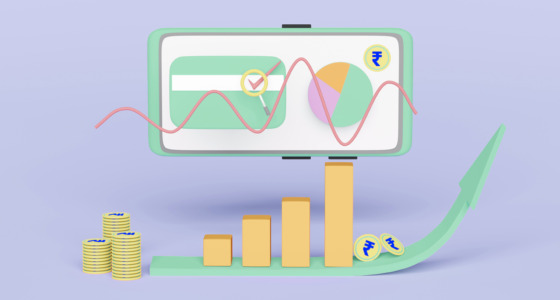

In his best-selling book ‘The Black Swan,’ Nassim Nicholas Taleb accurately describes the 21st-century financial market as “Extremistan,” where wild randomness and extreme volatility dominate the market.
So, whether you’re a long-term investor or an active day trader, you must anticipate that the wild randomness and extreme volatility can significantly impact your investment. What do you do in such a situation? This is where money management comes in. This guide describes what money management is, why it’s important, and the best money management techniques.
What is money management?

Money management is basically a defensive strategy implemented by traders and investors to ensure capital preservation and limit risks. Naturally, any form of financial investment or trading carries risk. That is why every financial services provider always warns, “Trading entails risk and could result in the loss of your capital..” or a statement to that effect.
At its core, money management involves deciding what to invest in, how much capital to spend per investment, the profit target, and determining the acceptable level of loss on investment. In the end, implementing proper money management techniques could be the one thing that prevents you from blowing up your account.
Best money management techniques
Whether you are a long-term investor or a short-term leveraged trader, the benefits of money management cannot be overrated. These are some of the best money management techniques that traders and investors can implement.
Only invest what you can afford to lose
The first rule in any financial investment is that traders should only invest amounts they are comfortable losing. Basically, this is an amount that won’t plunge them into poverty or indebtedness if lost in the markets. This seems like an odd rule, especially since the goal of investing in the financial market is to make a profit. However, as pointed out earlier, the markets are uncertain.
The aim here is never to invest funds that would be needed for immediate basic needs such as food, rent, or short-term bills. Ideally, it’s encouraged to set a maximum acceptable loss per week or month. When this loss is hit before the week or the month ends, stop trading immediately and then regroup.

Proper capital allocation
It goes without saying that every strategy, no matter how profitable, is not foolproof. Every trader and investor has bad days. And the role of proper capital allocation is to ensure that one bad trade doesn’t blow up the account.
The greed for quick and high returns has caused most investors to blow up their accounts and wish they had invested smaller amounts. That is why as a rule of thumb, it’s encouraged only to spend 2% – 3% of the account balance per trade.
For example, if the account balance is $1000, the maximum amount spent on a single trade is $30. Some might argue that this caps your potential profit compared to spending the whole $1000 in a trade. While this might be true, it also allows investors to withstand short-term bearish markets.
Diversification
With any investment, it is wise for investors to diversify their portfolio – invest in various asset classes. Diversifying a crypto portfolio means having different types of cryptocurrencies in the portfolio – there are over 8000 cryptos to choose from. So, why is diversification important?
Relying on a single-asset portfolio exposes the portfolio to adverse volatility. If the asset loses 10%, the portfolio also drops 10%. However, with a multi-asset portfolio, a drop in one asset is offset by the gain in another asset.
To achieve effective portfolio diversification, investors should pick assets from various classes. For example, when building a crypto portfolio, it’s advisable to invest in altcoins from various sectors – DeFi, NFT, GameFi, Storage, etc. Fundamentally, a diverse portfolio allows investors to benefit from different growth markets and insulates them from negative impact in one market.
Always use set stop loss and take profit targets
Even after observing the proper capital allocation rule, traders should always set the stop loss and take profit targets for every position opened. They are designed to limit the downside and protect the gains, especially in a volatile market.
Setting a stop loss ensures that your trade will be closed at a specific level, preventing your account from taking further losses. For a long trade, the stop loss is set below the entry price, and for a short sell, the stop loss level is set above the selling price.
On the other hand, the take profit target is a specific level at which traders want their positions to be closed and take the accumulated profits. Typically, the take profit level for a long trade is set above the entry price.
Similarly, when you go short, you expect that the price will drop; this means that you set the profit level for a short trade below the entry price.
Why is money management important?
The legendary investor Larry Hite once said, “…Throughout my financial career, I have continually witnessed examples of other people that I have known being ruined by a failure to respect risk. If you don’t take a hard look at risk, it will take you”. And this sentiment is the cornerstone of money management. There are two primary reasons why money management is important – capital preservation and peace of mind.
Capital preservation
Money management allows traders to live to fight another day. It allows them to weather the short-term losses by preserving their capital. It doesn’t matter if they have an incredible trading strategy with over 90% accuracy; neglecting money management measures could let one bad trade wipe out their account. Proper money management skills may allow a trading strategy with a low chance of success to become profitable in the long run. How? By curbing the negative impact of volatility and slippages, while capitalizing on the marginal gains.
Peace of mind
Active investing and trading have a psychological toll. However, money management techniques such as proper capital allocation, stop loss and take profit targets, and portfolio diversification bring some peace of mind. It gives investors some degree of certainty regarding their risks and potential downside. Remember, when you genuinely define and accept risks, you will be at peace with the outcome.
The bottom line
Every crypto exchange has a disclaimer that trading often involves risks. And that is true. But implementing proper risk management techniques helps traders significantly mitigate the risks involved. In the long term, implementing these techniques helps with capital preservation. More so, they also eliminate emotions from trading and investing, which prevents traders from falling into the trap of overtrading and revenge trading.










